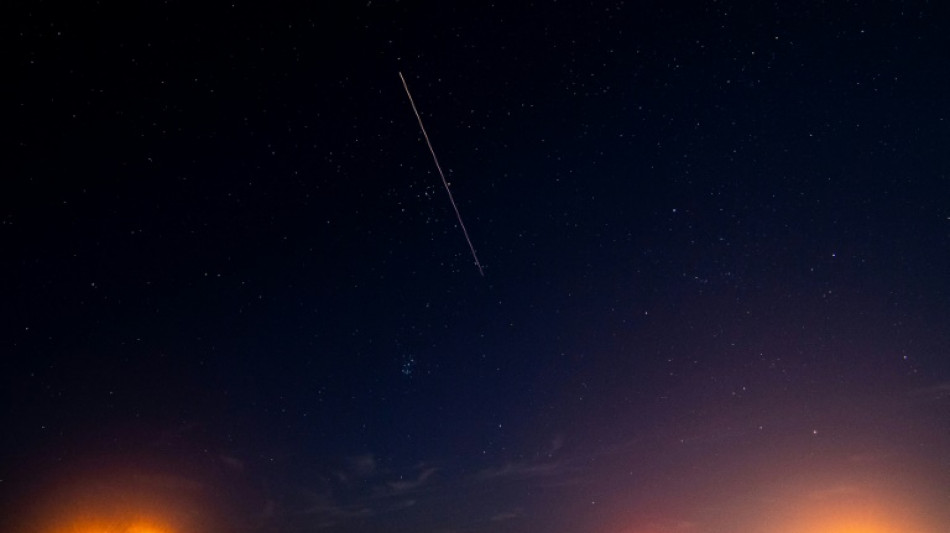
-
 Thailand says Cambodia agrees to border talks after ASEAN meet
Thailand says Cambodia agrees to border talks after ASEAN meet
-
Alleged Bondi shooters conducted 'tactical' training in countryside, Australian police say

-
 Swiss court to hear landmark climate case against cement giant
Swiss court to hear landmark climate case against cement giant
-
Knicks' Brunson scores 47, Bulls edge Hawks epic

-
 Global nuclear arms control under pressure in 2026
Global nuclear arms control under pressure in 2026
-
Asian markets rally with Wall St as rate hopes rise, AI fears ease

-
 Jailed Malaysian ex-PM Najib loses bid for house arrest
Jailed Malaysian ex-PM Najib loses bid for house arrest
-
Banned film exposes Hong Kong's censorship trend, director says

-
 Duffy, Patel force West Indies collapse as NZ close in on Test series win
Duffy, Patel force West Indies collapse as NZ close in on Test series win
-
Australian state pushes tough gun laws, 'terror symbols' ban after shooting

-
 A night out on the town during Nigeria's 'Detty December'
A night out on the town during Nigeria's 'Detty December'
-
US in 'pursuit' of third oil tanker in Caribbean: official

-
 CO2 soon to be buried under North Sea oil platform
CO2 soon to be buried under North Sea oil platform
-
Steelers edge Lions as Bears, 49ers reach playoffs

-
 India's Bollywood counts costs as star fees squeeze profits
India's Bollywood counts costs as star fees squeeze profits
-
McCullum admits errors in Ashes preparations as England look to salvage pride

-
 Pets, pedis and peppermints: When the diva is a donkey
Pets, pedis and peppermints: When the diva is a donkey
-
'A den of bandits': Rwanda closes thousands of evangelical churches

-
 Southeast Asia bloc meets to press Thailand, Cambodia on truce
Southeast Asia bloc meets to press Thailand, Cambodia on truce
-
As US battles China on AI, some companies choose Chinese

-
 AI resurrections of dead celebrities amuse and rankle
AI resurrections of dead celebrities amuse and rankle
-
Heirs Energies Agrees $750m Afreximbank Financing to Drive Long-Term Growth

-
 Black Book Poll: "Governed AI" Emerges as the Deciding Factor in 2026 NHS Procurement
Black Book Poll: "Governed AI" Emerges as the Deciding Factor in 2026 NHS Procurement
-
Hemogenyx Pharmaceuticals PLC Announces Update on Admission of Shares

-
 Pantheon Resources PLC Announces Shareholder Letter and Corporate Update on Dubhe-1
Pantheon Resources PLC Announces Shareholder Letter and Corporate Update on Dubhe-1
-
Tocvan Begins Trenching Material for the Pilot Mine and Pushes Ahead With Infrastructure Development

-
 Steelers receiver Metcalf strikes Lions fan
Steelers receiver Metcalf strikes Lions fan
-
Morocco coach 'taking no risks' with Hakimi fitness

-
 Gang members given hundreds-years-long sentences in El Salvador
Gang members given hundreds-years-long sentences in El Salvador
-
Chargers, Bills edge closer to playoff berths

-
 Gang members given hundred-years-long sentences in El Salvador
Gang members given hundred-years-long sentences in El Salvador
-
Hosts Morocco off to winning start at Africa Cup of Nations

-
 No jacket required for Emery as Villa dream of title glory
No jacket required for Emery as Villa dream of title glory
-
Amorim fears United captain Fernandes will be out 'a while'

-
 Nigerian government frees 130 kidnapped Catholic schoolchildren
Nigerian government frees 130 kidnapped Catholic schoolchildren
-
Captain Kane helps undermanned Bayern go nine clear in Bundesliga

-
 Captain Kane helps undermanned Bayern go nine clear
Captain Kane helps undermanned Bayern go nine clear
-
Rogers stars as Villa beat Man Utd to boost title bid

-
 Barca strengthen Liga lead at Villarreal, Atletico go third
Barca strengthen Liga lead at Villarreal, Atletico go third
-
Third 'Avatar' film soars to top in N. American box office debut

-
 Third day of Ukraine settlement talks to begin in Miami
Third day of Ukraine settlement talks to begin in Miami
-
Barcelona's Raphinha, Yamal strike in Villarreal win

-
 Macron, on UAE visit, announces new French aircraft carrier
Macron, on UAE visit, announces new French aircraft carrier
-
Barca's Raphinha, Yamal strike in Villarreal win

-
 Gunmen kill 9, wound 10 in South Africa bar attack
Gunmen kill 9, wound 10 in South Africa bar attack
-
Allegations of new cover-up over Epstein files

-
 Atletico go third with comfortable win at Girona
Atletico go third with comfortable win at Girona
-
Schwarz breaks World Cup duck with Alta Badia giant slalom victory

-
 Salah unaffected by Liverpool turmoil ahead of AFCON opener - Egypt coach
Salah unaffected by Liverpool turmoil ahead of AFCON opener - Egypt coach
-
Goggia eases her pain with World Cup super-G win as Vonn takes third


RNA base in asteroid samples suggests origins of life on Earth: study
The black particles from an asteroid some 300 million kilometres away look unremarkable, like pieces of charcoal, but they hold a component of life itself.
Scientists have discovered the chemical compound uracil, one of the building blocks of RNA, in just 10 milligrammes of material from the asteroid Ryugu, according to new research published on Tuesday.
The finding lends weight to a longstanding theory that life on Earth may have been seeded from outer space when asteroids crashed into our planet carrying fundamental elements.
It is some of the latest research from analysis of 5.4 grams of rocks and dust gathered by the Hayabusa-2 probe from the asteroid Ryugu.
Hayabusa-2 was launched in 2014 and returned to Earth's orbit in late 2020 with a capsule containing the sample from the asteroid.
The precious cargo was divided between international research teams and has already yielded several insights, including that some of life's building blocks, amino acids, may have been formed in space.
The first drop of water discovered in a near-Earth asteroid has also been found among the samples.
The new research, published Tuesday in the journal Nature Communications, went looking for another foundation of life: the nucleobases of RNA.
While DNA, the famed double helix, functions as a genetic blueprint, single-strand RNA is an all-important messenger, converting the instructions contained in DNA for implementation.
Like DNA, it is made up of bases: adenine, guanine, cytosine, and uracil.
Scientists have previously found some or all of these bases in different asteroids that landed on Earth as meteorites. However, they could not be sure the chemicals came from outer space or were contaminated when they landed.
"Since every meteorite has landed on the surface of the Earth where microorganisms are ubiquitously present everywhere, it always makes the interpretation on the origin of such biologically important molecules in meteorites more complex," said Yasuhiro Oba, associate professor at Hokkaido University and an author of the research.
- 'Like brewing coffee' -
Testing the Ryugu samples was a multi-phase process that began by putting them in hot water, like "brewing coffee or tea", Oba said.
Acid was then applied to extract molecules that were analysed by extremely sensitive tools capable of detecting the minute quantities of uracil present.
The discovery offers "strong evidence that one of the RNA components has been provided to the Earth even before the emergence of life", Oba told AFP.
"We expect it plays a role for prebiotic evolution and possibly the emergence of the first life," he said.
RNA's other bases were not found in the sample, though Oba believes they could be present at levels too low to be detected with the method used to find uracil.
He hopes to analyse new samples collected from space in coming years, including Osiris-REx's material from the asteroid Bennu, expected to arrive this year.
Yoshinori Takano, a scientist at the Japan Agency for Marine-Earth Science and Technology and author of the Ryugu research, said he was also keenly awaiting the Martian Moons eXploration project, set to launch from Japan next year and return around 2029.
It will collect samples from Phobos, one of the moons of Mars.
"I am sure it will be very hotly watched by organic cosmochemists for the next 10 years," said Takano.
Y.Nakamura--AMWN



